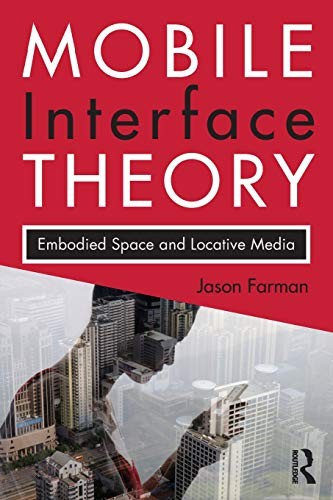Mobile interface theory - Info and Reading Options
embodied space and locative media
By Jason Farman

"Mobile interface theory" was published by Routledge in 2012 - New York, it has 168 pages and the language of the book is English.
“Mobile interface theory” Metadata:
- Title: Mobile interface theory
- Author: Jason Farman
- Language: English
- Number of Pages: 168
- Publisher: Routledge
- Publish Date: 2012
- Publish Location: New York
“Mobile interface theory” Subjects and Themes:
- Subjects: ➤ SOCIAL SCIENCE / Popular Culture - ART / Performance - Telecommunication - Location-based services - Social aspects - Mobile computing - SOCIAL SCIENCE / Media Studies - Mobile communication systems - Information technology - Information society - COMPUTERS - Computer Literacy - Computer Science - Data Processing - Hardware - General - Machine Theory - Reference - PHILOSOPHY / Movements / Phenomenology
Edition Specifications:
- Pagination: xii, 168 p. :
Edition Identifiers:
- The Open Library ID: OL25220513M - OL16528911W
- Online Computer Library Center (OCLC) ID: 787851416
- Library of Congress Control Number (LCCN): 2011025034
- ISBN-13: 9780415878906 - 9780415878913 - 9780203847664
- All ISBNs: 9780415878906 - 9780415878913 - 9780203847664
AI-generated Review of “Mobile interface theory”:
"Mobile interface theory" Description:
The Open Library:
"Mobile media -- from mobile phones to smartphones to netbooks -- are transforming our daily lives. We communicate, we locate, we network, we play, and much more through our mobile devices. In Mobile Interface Theory, Jason Farman demonstrates how the worldwide adoption of mobile technologies is causing a reexamination of the core ideas about what it means to live our everyday lives. He argues that mobile media's pervasive computing model, which allows users to connect and interact with the internet while moving across a wide variety of locations, produces a new sense of self -- a new embodied identity that stems from virtual space and material space regularly enhancing, cooperating or disrupting each other. Exploring a range of mobile media practices, including mobile maps and GPS technologies, location-aware social networks, urban and alternate reality games that use mobile devices, performance art, and storytelling projects, Farman illustrates how mobile technologies are changing the ways we produce lived, embodied spaces"--
Read “Mobile interface theory”:
Read “Mobile interface theory” by choosing from the options below.
Search for “Mobile interface theory” downloads:
Visit our Downloads Search page to see if downloads are available.
Find “Mobile interface theory” in Libraries Near You:
Read or borrow “Mobile interface theory” from your local library.
- The WorldCat Libraries Catalog: Find a copy of “Mobile interface theory” at a library near you.
Buy “Mobile interface theory” online:
Shop for “Mobile interface theory” on popular online marketplaces.
- Ebay: New and used books.